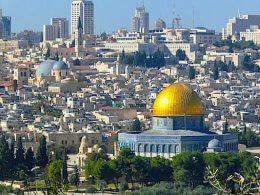For the first time in over four years, Prime Minister Benjamin Netanyahu flew to Jordan Tuesday to meet King Abdullah II, the premier’s office announced after the conclusion of the visit.
According to the statement, the two leaders discussed “strategic, security, and economic cooperation” during the meeting, the first between the leaders in over four years. They also spoke about the importance of the alliance between the countries.
The visit seemingly indicates that both sides are interested in avoiding the public fights that marked the relationship last time Netanyahu was in office.
It was Netanyahu’s first known visit to Amman since a secret trip in 2018, amid the Donald Trump administration’s attempt to broker a peace agreement between Israel and the Palestinians.
The Jordanians in their readout focused “on the need to respect the historical and legal status quo at the blessed Al-Aqsa Mosque/Al-Haram Al-Sharif and not to harm it.”
The admonition came weeks after National Security Minister Itamar Ben Gvir’s first visit to the Temple Mount in office, which led to furious condemnations from the Arab world. Jordan summoned Israel’s ambassador for a dressing-down.









